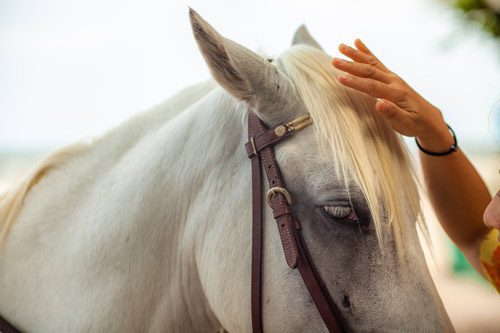
What Is Equine Interaction?
You’ve likely heard of animal-assisted therapy, or ATT, often defined as “the deliberate inclusion of an animal in a treatment plan. Generally, AAT involves a credentialed treatment provider who guides interactions between a patient and an animal to realize specific goals.” WebMD notes that equine-assisted services include many different program components, such as caring for horses, therapeutic riding, and working with the animals to achieve specific personal or professional skills.
So how is an equine interaction experience (EIE) different? For more insight, we asked Pam Salem, EAGALA, owner of Horses Teaching and Healing and co-coordinator of English Mountain’s equine interaction experience.
About Pam Salem
Salem is a certified equine experiential educator and founding member of the Equine Experiential Education Association. She uses her decades of experience showing, training, raising, and “being owned by” horses to help improve human/equine interaction. She believes “horses being horses help humans be better humans.”
At English Mountain Recovery since February 2010, Salem says she has greatly benefited from the wisdom of the residential support staff and has co-facilitated the EIE program for the past four years with Judith Sprinsky, a former equestrian with 17 years in recovery.
Equine Interaction at English Mountain Recovery
In a safe and supervised environment, individuals who participate in the EIE program work with therapists to establish trust and to interact with horses using verbal and non-verbal cues.
“Horses are not ridden and all activities are unmounted,” Salem says. “The skills of horsemanship are not taught beyond those that relate to safety, like how a horse sees differently from a human. The reason for this is to let the client discover insights on their own and to develop the ability to ask themselves Socratic questions for the purpose of developing independent thinking.”
Boston University notes that the point of experiential learning is to allow people to “learn by doing” in a guided setting, and use this hands-on experience for reflection and greater awareness. For some people in recovery, this might be an entirely new way of being, allowing them to process information differently than before.
Salem adds that some clients in addiction rehabilitation suffer from codependent or “people-pleasing” behaviors, often putting the needs of others before their own. Interacting with horses and experiencing how the animals positively react to independent thinking is, in Salem’s view, an essential building block for healthier relationships.
“It is an important element of experiential learning not to ‘steal the clients’ learning’ but to encourage confidence in their own problem-solving ability,” she says.
Deepening True Recovery Through Equine Interaction Experience
How can being with horses create better wellness in humans? For people managing aspects of addiction recovery and co-occurring disorders, they often need help staying in the present moment. Triggers, cravings, and other factors tug at their stability, sometimes without warning. Learning to stay in the present, instead of ruminating over the past or worrying about the future, is a key component to long-lasting health.
Believe it or not, horses are deeply empathetic to those feelings. Salem says as prey animals, horses are hyper-vigilant and skilled at interpreting authentic biofeedback through body language. “In order to feel safe, horses like us to be the same on the outside as we are on the inside, to be congruent,” she says. “They do not judge us if we are not, they simply cannot depend upon us for their safety because things eat them, and they need to sense that we are paying attention. Understanding this helps clients stay present in their bodies.”
While someone might initially feel uncomfortable around a large animal, they can take heart in that the horses are also trying to gauge their surroundings. But the animals have a strong level of trust established with Salem and Sprinsky, who assure their natural needs are met. So this allows the horses to generate a feeling of calm.
“This provides a space of coherence for our clients to become regulated and in harmony within themselves after a struggle with inner turmoil that has brought them here for healing,” Salem says.
Benefits of Equine Interaction
What do people experience in such an accepting and nurturing environment? Salem provides this explanation: “Johann Hari writes that ‘the opposite of addiction is not sobriety, it is connection.’ Horses teach authentic connection without judgment. In activity with horses, that connection is felt and learned as body knowledge that the client can take back into life as a remembered internal experience.”
Some people, she says, are very charming and have learned to be manipulative to get what they want, but may never have had the opportunity for a real authentic connection. The horses can give them that experience. “It is often profound. Our clients learn about boundaries, asking for help, taking it ‘one step at a time’ in the activities they do with the horses as well as gaining confidence in problem-solving as mentioned before,” Salem says. “The insights they gain experientially with the tools the counselors teach them help them to build a solid base for their recovery.”
Other advantages of EIE include:
- Better moods
- Greater work ethic and responsibility
- Increased trust
- Improved communication
- Mindfulness
- Stress relief
“After being dissociated from their bodies, they learn how to be present, identify and manage their emotions, and reconnect to their own inner wisdom,” Salem says. “The horses help keep them in the present moment, teaching mindfulness in a gentle, pleasant way.”
A Transformative Experience
Salem says people who participate in this form of interaction with horses are surprised by the authentic emotional connection and insights achieved.
“All activity with the horses is ‘challenge by choice’, and some clients learn a lot by simply watching and then discussing the results with those who have experienced it with them,” she says. “That is the benefit of the 12-Step community.”
She shares one particularly touching story about a English Mountain client who, after a seemingly simple activity, exclaimed, “Thank you so much for this experience. I thought we were just coming down here to pet horses. I never dreamed what I would learn.” And after finishing the program, the client told her, “It was here that I found my connection to my higher power and got my greatest learning. It has always been my favorite time of the week.” He knelt, quietly stroking the horse he learned with before departing.
“Somehow that is the gift the horses bring: an authentic connection that transfers positively not only to human interaction but also to connection with one’s higher power,” Salem says. “In mythology, horses travel between the material and spiritual worlds. At English Mountain Recovery, the mountain touches more than the sky.”
Our board-certified staff of experts understands the power of holistic therapy methods such as equine interaction experience, and combines them with individualized medical assistance, 12-Step groups, gender-specific groups, and multiple types of counseling. Our goal is to provide the foundation you deserve for lasting wellness.
 Looking for an addiction rehab near Nashville? To learn more about programs offered at English Mountain Recovery, call and speak with someone today at (877) 615-8569. We are ready to help you or your loved one recover.
Looking for an addiction rehab near Nashville? To learn more about programs offered at English Mountain Recovery, call and speak with someone today at (877) 615-8569. We are ready to help you or your loved one recover.Resources:



